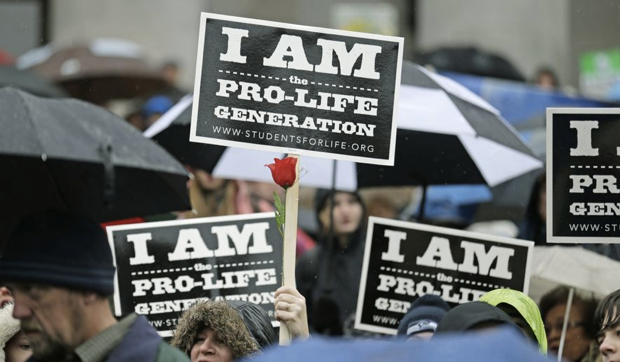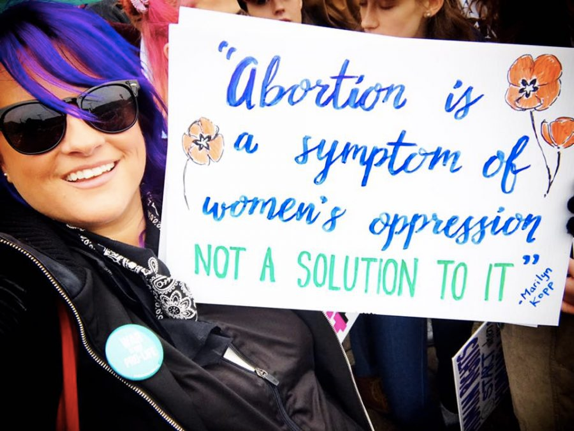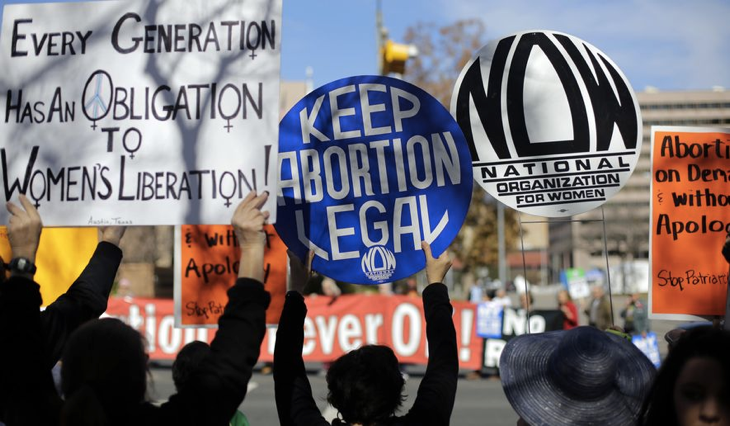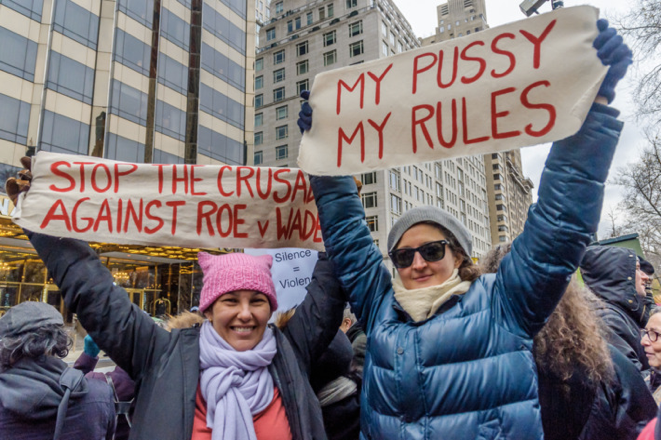By Rachael Andrews
After the Women’s March on Washington on January 21, a day after Donald Trump’s inauguration, drew historic crowds and brought together women from all over the country to D.C., Emily Crockett of Vox wrote an article titled, “Can you be a pro-life feminist? The Women’s March on Washington offered some insights,” and indeed it did.
The march included people from various genders, gender identities, races, ethnicities, religions, creeds, backgrounds, and sexual orientations that felt unsafe or demonized by the current administration’s rhetoric and campaign promises. It was a proactive move in order to demonstrate civic commitment to protecting the rights of those individuals that feel threatened and to draw attention to issues that those citizens care about. The march was unbelievably successful, with sister marches across the country and the world, from the United States to Kenya to Antarctica.
So, is there room in feminism for pro-life women? There were concerns among pro-life organizations as to if they would be included in the march, since one of the march’s core platforms was “open access to safe, legal, and affordable abortion and birth control for all people.” Many pro-life women, who were just as concerned with a Trump presidency, felt that they would not be welcomed at a march that was co-sponsored by Planned Parenthood and NARAL Pro-Choice America. Indeed, the march was at one time also sponsored by a pro-life group from Texas, New Wave Feminists, but the group was dropped from the sponsors, as the march organizers stressed the pro-choice platform of the event.

Many pro-life women share the same concerns as feminists: the wage gap, women’s rights and human rights, climate change, and women’s relative lack of access to healthcare. In some instances, the only differences between pro-life women and pro-choice feminists is abortion. So the question remains: can the feminist movement accommodate both points of view?
The answer is complicated.
On one hand, if the feminist movement is strictly a pro-choice movement – meaning that it excludes pro-life women – that will ostracize those women who identify with feminism but not abortion. If feminism is to be a movement by all women, for all women, then excluding women would be harmful to the cause, especially if they want to be involved in the feminism movement. On the other hand, the idea of allowing women the freedom to choose what to do with their own reproductive systems is a fundamental idea of contemporary feminism.
The modern pro-life movement is not quite as antiquated as the popular rhetoric would have pro-choice women believe, however. For instance, as Emily Crockett writes in the aforementioned article for Vox, “The idea of showing compassion for women who seek abortion has become much more common in the pro-life movement over the past few decades than fire-and-brimstone rhetoric. Pro-life advocates frequently argue that while abortion is wrong because it takes a human life, women also ‘deserve better’ than abortion.”
She goes further: “Many pro-lifers repeat false claims that abortion is more dangerous than it is, or that it causes breast cancer, to argue that abortion harms women. But others — especially the younger, savvier, and often more secular pro-lifers of the millennial generation — also argue that women wouldn’t need to turn to abortion out of concern for their education or career if the broader culture was less hostile to women’s fertility and more supportive of mothers (emphasis mine).”

That last part is an especially significant departure from the oft-cited pro-life movement. The emphasis on the broader culture’s subversive hostility to motherhood is an idea that contemporary feminists can certainly get behind. It could perhaps serve as the catalyst for pro-life women and pro-choice feminists to build a coalition through some common ground.
The important thing to note, perhaps the elephant in the room, is that abortion is legal. Roe v. Wade reaffirmed a woman’s right to privacy under the Due Process clause of the 14th amendment to the United States Constitution, meaning that the pro-choice position is the law of the land in the United States. Politics aside, pro-life women can exist in a place where pro-choice is legal. It is possible for pro-life women to personally and morally object to abortion, while not imposing their beliefs on other women who may not feel the same. If abortion were illegal, there would be no space for women where abortion is a safe, healthy choice.
Contemporary feminism is, of course, a movement for all women who wish to acknowledge and fight misogyny, injustice, and inequality in all its insidious and often subversive forms. Many feminists struggle with the idea of including pro-life women in the movement. Contemporary feminism tends to take an intersectional view of reproductive justice, which can include many factors that affect women’s reproductive lives – health insurance, affordability and availability of reproductive services (both abortion and prenatal care), and a supportive environment for a woman to raise a child in if she chooses to carry the pregnancy to term. These are issues that many pro-life women and pro-choice feminists can agree on, along with others that the Women’s March sought to address: climate change, immigrants’ rights, LGBTQ rights, affordable healthcare, child care, and paid family leave.
The women involved in the march agree on these issues, but not the one that ends up dividing them – abortion. Pro-choice sees abortion as a solution to a problem too many women face, and a freedom that allows them to choose what happens to their bodies. Pro-life sees abortion as a symptom of a larger societal problem with motherhood and fertility. The reality is still that pro-life women can exist and promote their personal and moral beliefs in a pro-choice world, but pro-choice cannot do the same in a pro-life world. The pro-life stance can be one that is taken personally and morally, but politically, the consequences can affect real women who do not share the same personal and moral beliefs.

For many feminists, it is not just about personal beliefs, but allowing other women to have the freedom to make a choice that is best for them. Pro-life policies are an imposition on pro-choice feminists and other women who feel they should be able to choose to have an abortion or start a family – without being forced either way. Pro-life women may find a place in feminism as long as their personal beliefs do not limit the freedom of choice for other women.


